
Nachem Malech Mailer, known by his pen name Norman Kingsley Mailer, was an American novelist, journalist, playwright, and filmmaker. In a career spanning more than six decades, Mailer had 11 best-selling books, at least one in each of the seven decades after World War II.
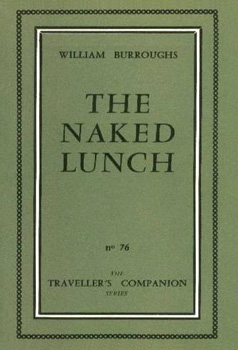
Naked Lunch is a 1959 novel by American writer William S. Burroughs. The book is structured as a series of loosely connected vignettes, intended by Burroughs to be read in any order. The novel follows the junkie William Lee, who takes on various aliases, from the U.S. to Mexico, eventually to Tangier and the dreamlike Interzone.
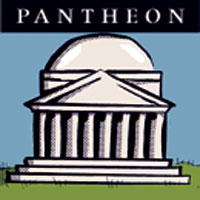
Pantheon Books is an American book publishing imprint with editorial independence. It is part of the Knopf Doubleday Publishing Group.
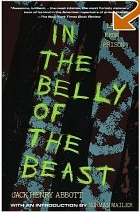
In the Belly of the Beast is a book written by Jack Henry Abbott and published in 1981.

The New American Library is an American publisher based in New York, founded in 1948. Its initial focus was affordable paperback reprints of classics and scholarly works as well as popular and pulp fiction, but it now publishes trade and hardcover titles. It is currently an imprint of Penguin Random House; it was announced in 2015 that the imprint would publish only nonfiction titles.

Kelly Link is an American editor and writer. Mainly known as an author of short stories, she published her first novel The Book of Love in 2024. While some of her fiction falls more clearly within genre categories, many of her stories might be described as slipstream or magic realism: a combination of science fiction, fantasy, horror, mystery, and literary fiction. Among other honors, she has won a Hugo Award, three Nebula Awards, and a World Fantasy Award for her fiction, and she was one of the recipients of the 2018 MacArthur "Genius" Grant.
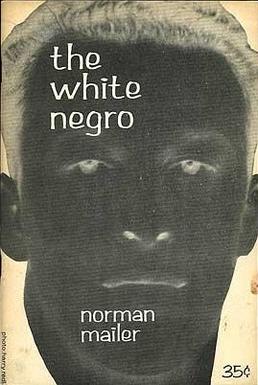
The White Negro: Superficial Reflections on the Hipster is a 9,000-word essay by Norman Mailer that connects the "psychic havoc" wrought by the Holocaust and atomic bomb to the aftermath of slavery in America in the figuration of the Hipster, or the "white negro". The essay is a call to abandon Eisenhower liberalism and a numbing culture of conformity and psychoanalysis in favor of the rebelliousness, personal violence and emancipating sexuality that Mailer associates with marginalized black culture. The White Negro was first published in the 1957 special issue of Dissent, before being published separately by City Lights. Mailer's essay was controversial upon its release and received a mixed reception, winning praise, for example, from Eldridge Cleaver and criticism from James Baldwin, Ralph Ellison, and Allen Ginsberg. Baldwin, in particular, heavily criticized the work, asserting that it perpetuated the notorious "myth of the sexuality of Negros" and stating that it was beneath Mailer's talents. The work remains his most famous and most reprinted essay and it established Mailer's reputation as a "philosopher of hip".

The New York Edition of Henry James' fiction was a 24-volume collection of the Anglo-American writer's novels, novellas and short stories, originally published in the U.S. and the UK between 1907 and 1909, with a photogravure frontispiece for each volume by Alvin Langdon Coburn. Two more volumes containing James' unfinished novels, The Ivory Tower and The Sense of the Past, were issued in 1917 in a format consistent with the original set. The entire collection was republished during the 1960s by Charles Scribner's Sons. The official title of the set was The Novels and Tales of Henry James, though the more informal title was suggested by James himself and appears as a subtitle on the series title page in each volume. It has been used almost exclusively by subsequent commentators.
The Road to Science Fiction is a series of science fiction anthologies edited by American science fiction author, scholar and editor James Gunn. Composed as a textbook set to teach the evolution of science fiction literature, the series is now available as mass market publications. The six-volume set collects many of the most influential works of the genre. It was published originally by Signet and then by White Wolf Games Studio. Volumes 1 through 4 are currently being reprinted in paperback format by the company Scarecrow Press.

J. Michael Lennon is an American academic and writer who is the Emeritus Professor of English at Wilkes University and the late Norman Mailer’s archivist and authorized biographer. He published Mailer's official biography Norman Mailer: A Double Life in 2013. He edited Mailer's selected letters in 2014 and the Library of America's two-volume set Norman Mailer: The Sixties in 2018.

Why Are We In Vietnam? (WWVN) is a 1967 novel by the American author Norman Mailer. It focuses on a hunting trip to the Brooks Range in Alaska where a young man is brought by his father, a wealthy businessman who works for a company that makes cigarette filters and is obsessed with killing a grizzly bear. As the novel progresses, the protagonist is increasingly disillusioned that his father resorts to hunting tactics that seem dishonest and weak, including the use of a helicopter and taking credit for killing a bear. At the end of the novel, the protagonist tells the reader that he is soon going to serve in the Vietnam War as a soldier.

Advertisements for Myself is an omnibus collection of fiction, essays, verse, and fragments by Norman Mailer, with autobiographical commentaries that he calls "advertisements." Advertisements was published by G.P. Putnam's Sons in 1959 after Mailer secured his reputation with The Naked and the Dead, then endured setbacks with the less-enthusiastic reception of Barbary Shore (1951) and The Deer Park (1955). Advertisements, though chaotic, unapologetically defiant, and often funny, marks the beginning of Mailer's mature style.
"The Time of Her Time" is a 1959 short story written by Norman Mailer, first appearing in his miscellany Advertisements for Myself. The story depicts macho Irish Catholic bullfighting instructor Sergius O'Shaugnessy and his sexual conquest of a young, middle-class Jewish college girl, Denise Gondelman. The short story was adapted to film in 2000 by Francis Delia. On multiple occasions, Mailer has touted "The Time of Her Time" as "the godfather of Lolita."

"Superman Comes to the Supermarket" is an essay by the American novelist and journalist Norman Mailer about the 1960 Democratic convention. Originally published in Esquire as "Superman Comes to the Supermart," this essay was Mailer's initial foray into political journalism. It characterizes John F. Kennedy as a potential "existential hero" who could revitalize the US after eight years under Dwight D. Eisenhower to rediscover its lost imagination. "Superman" further develops and emphasizes Mailer's concern with the importance of the individual's will and creativity that must challenge conformity and obedience in American life to fully realize a genuine life. With "Superman", Mailer extends New Journalism by taking an active role in the narrative, which would characterize much of his subsequent journalistic style and lead to his Pulitzer Prize for The Armies of the Night in 1968.

The Short Fiction of Norman Mailer is a 1967 anthology of short stories by Norman Mailer. It is grouped into eight thematic sections and contains nineteen stories, many appearing in one of Mailer's miscellanies; thirteen were published in periodicals or other anthologies before appearing in this collection. The collection was reprinted in hardcover in 1980 and some of the stories were reprinted in other volumes.
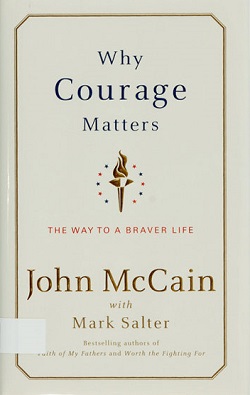
Why Courage Matters: The Way to a Braver Life is a 2004 book by United States Senator John McCain with his frequent collaborator and aide Mark Salter. Published by Random House, it is mostly mini-biographies and mini-commentaries on others, but contains a small autobiographical element.

"The Man Who Studied Yoga", a novella by Norman Mailer written in 1952, was first published in the 1956 collection New Short Novels 2 then later in Mailer's 1959 miscellany Advertisements for Myself (AFM). It is a tale of a "writer manqué", or a writer who fails to write, reflecting some of Mailer's own anxiety in the 1950s as he tries to reinvent himself.

Robert Silverberg Presents the Great SF Stories: 1964 is an American anthology of short stories, edited by Robert Silverberg and Martin H. Greenberg, first published in hardcover by NESFA Press in December 2001. It is a continuation of the Isaac Asimov Presents The Great SF Stories series of short story anthologies, which attempts to list the great science fiction stories from the Golden Age of Science Fiction. This book is a continuation of the book series The Great SF Stories originally edited by Isaac Asimov and Martin H. Greenberg with the last one published in 1992.

This Norman Mailer bibliography lists major books by and about Mailer, an American novelist, new journalist, essayist, public intellectual, filmmaker, and biographer. Over a fifty-nine-year period, Mailer won two Pulitzer Prizes and had eleven books spend a total of 160 weeks on the New York Times bestseller list. Mailer's output included fiction, non-fiction, poems and essays. Biographer J. Michael Lennon called Mailer the chronicler of the American Century, and a talent whose career has "been at once so brilliant, varied, controversial, improvisational, public, productive, lengthy and misunderstood".
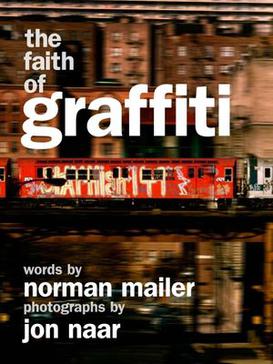
The Faith of Graffiti is a 1974 essay by American novelist and journalist Norman Mailer about New York City's graffiti artists. Mailer's essay appeared in a shorter form in Esquire and as a book with 81 photographs by Jon Naar and design by Mervyn Kurlansky. Through interviews, exploration, and analyses, the essay explores the political and artistic implications of graffiti. The essay was controversial at the time of publication because of its attempt to validate graffiti as an art form by linking it with great artists of the past. Some critics also said Mailer was using the essay as a platform to express his political grievances. Faith grew out of Mailer's existential philosophy of the hip, in which a Hipster is guided by his instincts regardless of consequences or perception, and upholds graffiti as a subversive and healthy check on the status quo. Like several of his other non-fiction narratives, Mailer continued his use of new journalism techniques, adopting a persona, the A-I or "Aesthetic Investigator", to provide both an objective distance from the topic and to engender the text with the creative and critical eye of the novelist.
















